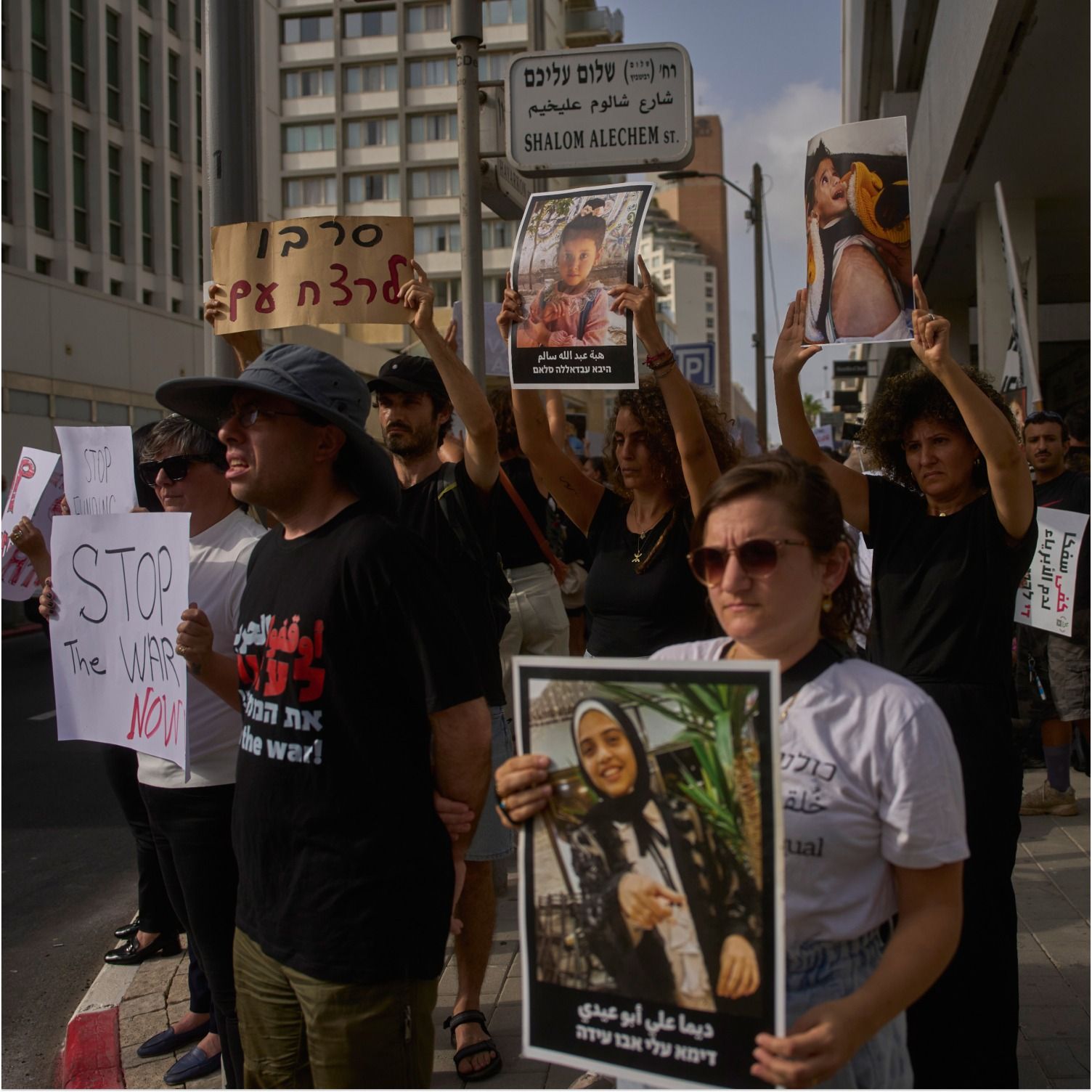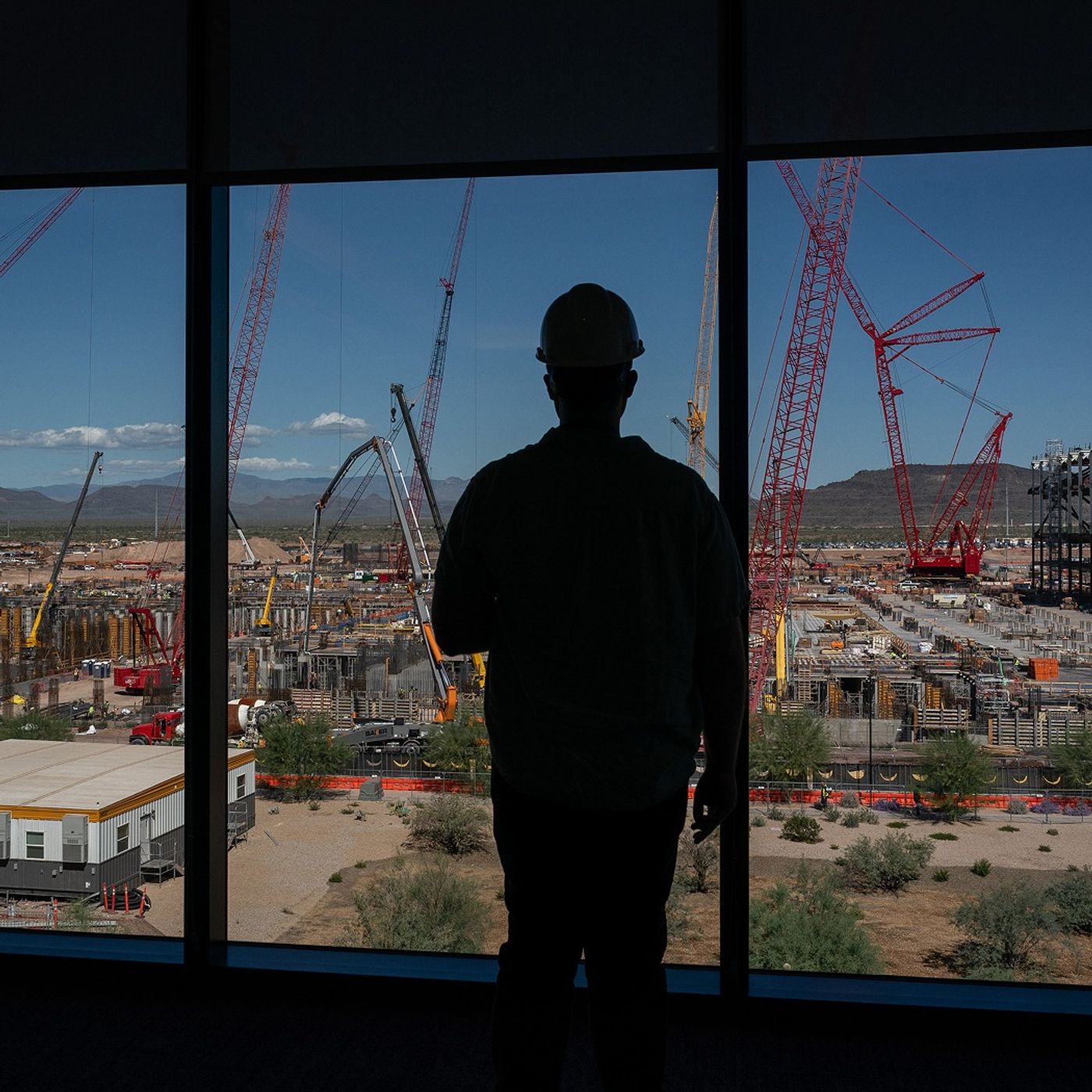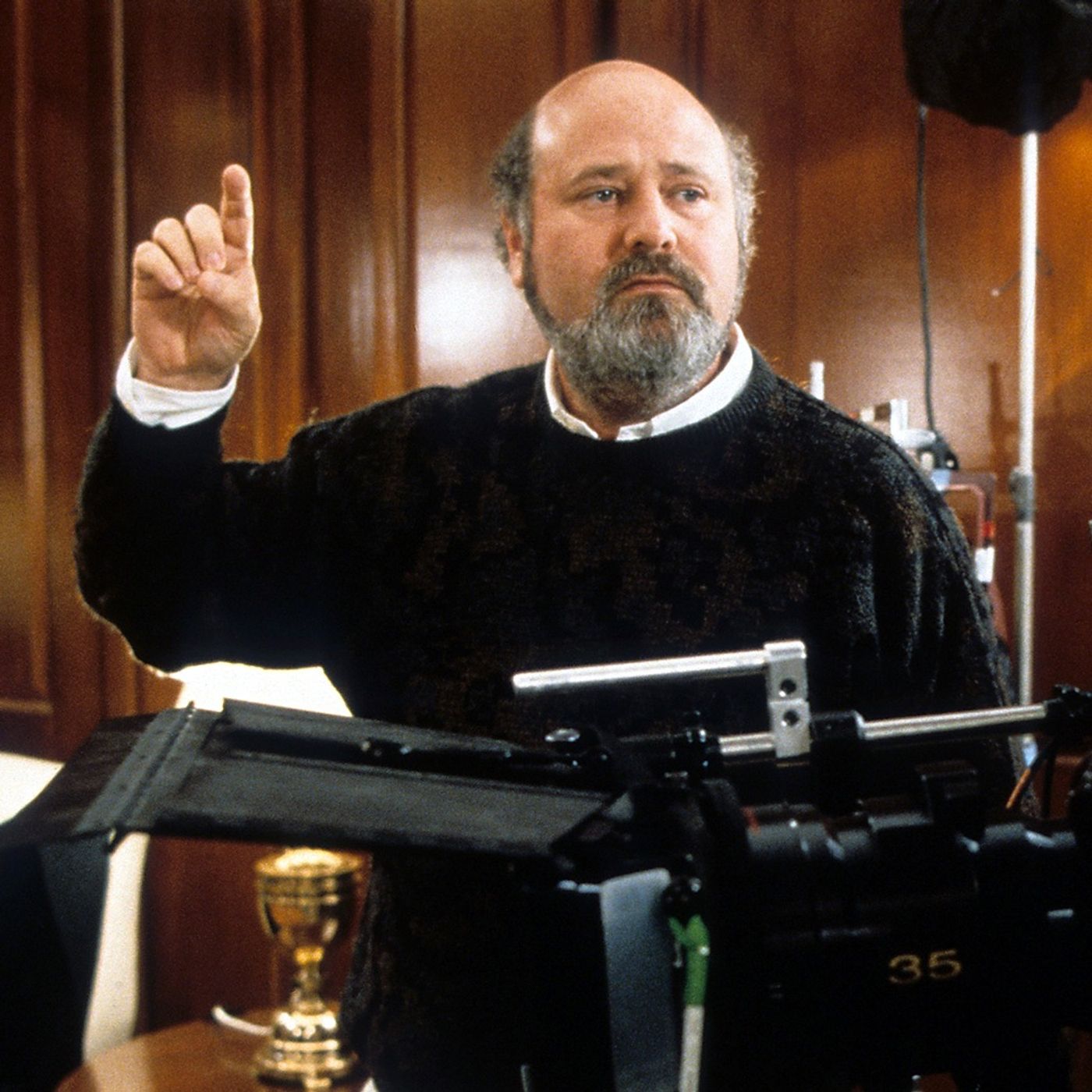What Many Israelis Don’t Want to See
Emmanuelle Elbaz-Phelps, an independent Israeli journalist, discusses whether any of the outcry is resonating with Israeli society.
Press play and read along
Transcript
Speaker 1 This podcast is supported by the International Rescue Committee.
Speaker 1 When conflict and disaster strike, the IRC is ready to help families immediately after an emergency occurs and long-term with health care supplies, clean water, and other critical aid.
Speaker 1 As crises continue in Gaza, Ukraine, Sudan, and around the world, the IRC is committed to ensuring families can survive, recover, and rebuild their lives.
Speaker 1 For a limited time, all donations are doubled to help the IRC meet this moment of unprecedented need. Make your matched gift at rescue.org/slash rebuild.
Speaker 2 From the New York Times, I'm Rachel Abrams, and this is the Daily.
Speaker 3 According to UNICEF, more than 320,000 children, the entire population under age five in Gaza, are at risk of acute malnutrition.
Speaker 3 14
Speaker 4 is three months old, a child of a Gaza that's starving. She now weighs less than when she was born.
Speaker 2 As the images of starving Palestinian children continue to come out of Gaza, and times reporting and aid groups have confirmed a rising number of deaths from malnutrition, there's been a new round of international outrage,
Speaker 2 including from Israel's own allies.
Speaker 6 28 nations, including the UK, France, and Japan, issued a joint statement denouncing the Israeli government's, quote, brip feeding of aid.
Speaker 7 We see starving babies, children too weak to stand,
Speaker 7 images that will stay with us for a lifetime.
Speaker 7 The suffering must end.
Speaker 8 Today, Israel insists that there are no restrictions on aid deliveries and says there is no starvation.
Speaker 2 I speak with an Israeli journalist about whether any of that outcry is resonating with Israeli society.
Speaker 2 It's Friday, August 1st.
Speaker 2 Can you start by saying your name for us?
Speaker 9
Sure. So, my name is Emmanuel Elbas-Phelps.
I'm a journalist. I'm actually independent.
I write for
Speaker 2 Emmanuel Elbas-Phelps,
Speaker 2 a French-Israeli independent journalist who works for various outlets as a correspondent in Israel.
Speaker 9 Yes, and I do sit as a contributor every Saturday evening on
Speaker 9 news talk show on Channel 13 in Israel.
Speaker 2 A couple weeks ago, while Emmanuel was doing her regular appearance on one of the mainstream channels in Israel, she said something you don't normally hear on Israeli television.
Speaker 2 And a clip of it was shared widely on social media.
Speaker 9 So, this talk show is a news talk show every Saturday evening on Israeli television.
Speaker 9 And we discussed the current events and, of course, the war every week. And the clips you saw was us talking about the tolls of the war.
Speaker 9 And so we talked about the hostages still hold by Hamas
Speaker 9 and how painful it is and the agony of the family and how it is impossible for the Israeli society to start and heal while they are still in captivity.
Speaker 9
We talked about the soldiers, the Israeli soldiers that are falling during the war. And so we were talking about the victims.
And then
Speaker 9 I thought that we must point to the other victims.
Speaker 9 So I said that I want to say something now that is not really spoken on Israeli television.
Speaker 9
This war is also killing a lot of Palestinians in Gaza, which is, you know, just a statement, a factual statement. And the anchors, I think, of course, not planned.
They had a gut reaction.
Speaker 9 Okay.
Speaker 9 And one of them said, well, okay, in a manner of like, we heard enough, we can move on.
Speaker 9 And I insisted not to.
Speaker 9 The second anchor, he said, Emmanuel, I respect you a lot, but I do not have to worry about what's happening in Gaza.
Speaker 9 These are my enemies.
Speaker 9 And I told him, well, you can let me say that I do worry about what's happening in Gaza.
Speaker 9 And when you see the images coming out of Gaza, I don't understand how people can look at them and not get horrified about them.
Speaker 9 And he said, yeah, you can say whatever you want. It's not that he didn't want me to talk, but he was not really interested in it.
Speaker 9 And I have to say, it's representative of a part of the Israeli population, a pretty important part of the population here in Israel. He's not ready to hear about
Speaker 9 the suffering of the civilians in Gaza.
Speaker 2 How do you explain that reaction, not just from this anchor, but from the people that you think he is representative of within Israel?
Speaker 9 So I think
Speaker 9 something that is pretty hard to grasp, I think, outside of Israel is how much 7th of October is still alive in Israel.
Speaker 9 How the population is not living a post-traumatic event, but a traumatic event still.
Speaker 9
Hostages are still over there. The pain of this day is huge.
I was in Neroz a week ago.
Speaker 2 That was the kibbutz that suffered some of the most casualties on October 7th.
Speaker 9
Yes. Once of every four inhabitants in Neroz has been either killed or either kidnapped.
And some of the houses that are still burnt to the ground, you can still get the smell of this day.
Speaker 9 It's horrific. And this is how alive and how painful the 7th of October is still for Israelis.
Speaker 9 And so
Speaker 9 it is so much to grasp.
Speaker 9 and so much to live with that a majority of the Israelis, I think, do not have room in their heart for compassion for the population in Gaza which is the place where the attack of Hamas the terrorist group came from
Speaker 9 but we as the Israeli media we are part of the reason that Israelis are not able
Speaker 9 to look at the other side what do you mean by that so First you have to understand that
Speaker 9 you have seen pictures coming out from Gaza for almost two years. Israelis almost didn't see pictures of daily life in Gaza, people living in tents, looking for water and for flour on the ground,
Speaker 9 and really hardship of every day under the war. And of course, horrific pictures of people being killed.
Speaker 9 Most of the Israelis do not see that
Speaker 9 because the Israeli media has been failing its job by not showing what's happening in Gaza. You almost have no stories, human stories on Israeli TV.
Speaker 9 And of course, there are some media that are showing and are talking about it. For sure, a ret newspaper is bringing human stories and very hardship stories from Gaza on a daily basis.
Speaker 9 But mainstream media is... during most of the war it's been silent about it and you would see gaza only when you would see you know destruction from above kind of to show how IDF is winning.
Speaker 9 But you wouldn't see anything that is really human and the suffering of the population.
Speaker 9 And I think that
Speaker 9 was
Speaker 9 partly because journalists are Israelis and almost everybody knows somebody that has been killed or kidnapped. And military service is mandatory in Israel.
Speaker 9 So everybody has been in the army or his kid is going to be in the army or his uncle is in the army. So it's really hard to have a distinction between you as a civilian and you as a journalist.
Speaker 9 And at the beginning when 7th of October was so violent, nobody wanted to hear about the other side.
Speaker 9
But at one point, I think TVs and media in general convinced themselves that the public don't want to hear. The public doesn't want to see Gaza.
The public is not ready for it.
Speaker 9 And that's where I think the mistake happened.
Speaker 2 I just want to push back, Emmanuel, on one thing you said, though, which was you mentioned that one factor shaping Israeli sentiment is that they haven't been shown images coming out of Gaza.
Speaker 2 Those images haven't really been broadcast on Israeli television, Israeli media. But I mean, a lot of this stuff is coming from social media, right? Instagram, TikTok, Twitter.
Speaker 2 It sort of feels like what's happening in Gaza, the situation on the ground is accessible to people who want to see it.
Speaker 2 It would not have been hard, in other words, words, to find these images over the past couple years.
Speaker 2 And so what you're describing, sure, it sounds like they're not getting it from Israeli media, but is there also like an active looking away that's happening?
Speaker 5 Yes.
Speaker 9
Definitely. Definitely.
You're right.
Speaker 9 If you want to see what's happening in Gaza, you can take your phone, you can go on some accounts on Instagram or Twitter, and you can, you know, the algorithm will do the rest and sending you pictures on a daily basis and you can be really aware of what's happening.
Speaker 9 And yes, there is a looking away decision by most of the Israelis.
Speaker 9 And I think it's really because of what we talked about a few minutes ago, the sense of I cannot bear the suffer of these other people.
Speaker 9 And I don't want this to get personal because it's not personal, right? This is really representative of a society problem and it's not about him or me.
Speaker 9 But I will give this example because I think it will answer your question.
Speaker 9 We had another
Speaker 9 show last Saturday, and we had the talk about the horrific pictures of Gazan children starving.
Speaker 9 And he said the anchor that is not interested in,
Speaker 9 he doesn't want to see the pictures.
Speaker 9
He didn't say it's not happening. He doesn't say the pictures are not true or fake.
He didn't say that.
Speaker 9 He doesn't want to see the pictures because he cares about the children of Israel and he has to care about them and he's worried about them and not the children in Gaza.
Speaker 9 And then he said that me feeling empathy for the children in Gaza means that I forgot about the events of October.
Speaker 9 And that those hungry kids that we are now talking about, he thinks that in a few years they will come and they will try and kill us.
Speaker 9 And I answer to that: if we don't want to get to this point, we have to start to work on a political solution now.
Speaker 9 Because this is going to take a generation, or maybe a generation and a half, maybe two, but it's never going to happen.
Speaker 9 The possibility of getting to a point where mentality change is never going to come if we don't work on a political solution and if there is no horizon for another future.
Speaker 9 And that sounds very utopic on an Israeli panel, on a discussion.
Speaker 9 But I want to say something about the reaction I got after this incident on the show that you were referring to at the beginning of our talk.
Speaker 9 It really surprised me because I got hundreds, hundreds of messages on every social platform by people I do not know, and that were saying either thank you, either kola kavod, which is like congratulations, or whatever, like please continue, continue to talk about Gaza.
Speaker 9 And I was very surprised because I didn't expect this amount of messages by people I don't know that were telling me either
Speaker 9 thank you for telling us about the reality, or some also were saying, I don't really care what's happening in Gaza personally, but I do think that a journalist has to do his job.
Speaker 9 I think it took time, but I think now
Speaker 9 it's changing because Israelis are also understanding that they do not see what the world sees and they have to look at it in the eyes.
Speaker 9 We'll be right back.
Speaker 11 At the University of Arizona, we believe that everyone is born with wonder. That thing that says, I will not accept this world that is.
Speaker 11 While it drives us to create what could be,
Speaker 12 that world can't wait to see what you'll do.
Speaker 11 Where will your wonder take you? And what will it make you?
Speaker 3 The University of Arizona.
Speaker 11 Wonder Makes You.
Speaker 3 Start your journey at wonder.arrizona.edu.
Speaker 12 What are you doing right now? Now, what would you rather be doing? It's your choice because life is full of possibilities.
Speaker 12 And around every corner, there's something new to discover, to experience, to feel. That's why Mazda crafts cars for those who choose to do more.
Speaker 12
And now, with the Mazda CX-50 hybrid, you can go farther. What you choose to do with all those extra miles is up to you.
The new Mazda CX-50 hybrid. Move and be moved.
Speaker 14 The air is cleaner than it's been in decades, and much of the progress made in reducing emissions is due to the U.S. oil and gas industry.
Speaker 13 Today, clean burning natural gas generates more electricity and reliably powers data centers, hospitals, schools, and so much more.
Speaker 14 People rely on oil and gas and on energy transfer to safely deliver it through an underground system of pipelines across the country.
Speaker 13 Learn more at energy transfer.com.
Speaker 2 You mentioned that things have been changing the last week. Can you just talk about what has prompted the change that you mentioned?
Speaker 9 Yes, so there has been a few small events that I think when you add them together, they might explain it.
Speaker 9 So around two weeks ago, there was a demonstration outside of Channel 12 studios by this peace group. It's called Standing Together.
Speaker 9 And this is a group of Israelis and Palestinians that demonstrate together every week and have actions and they call for the end of the war.
Speaker 9 And they also, in Tel Aviv and other parts of Israel, they show pictures of children of Gaza. And they came outside of the studio of Channel 12, which is the main television channel in Israel.
Speaker 9 And they were demonstrating and asking the journalists to cover the war in Gaza and show the pictures of Gaza
Speaker 9 and then
Speaker 9 from that one of the journalists of the channel wrote in the group chat that maybe we should actually think about that or talk about that or cover the subject and others were arguing that no
Speaker 9 One actually said that when you talk to some of the hostages that came back
Speaker 9 and some of them say that nobody was innocent in Gaza and nobody was helping them in Gaza, even civilians, then
Speaker 9 you can understand why we don't connect to the suffering of the Gazans.
Speaker 9 And another journalist answered that this is not a question of connecting or feeling for them, but this is the job of a journalist. And all this conversation that wasn't really longed, it was leaked.
Speaker 9 And I think that had an influence on the public discussion because it was out, you know, like these journalists are very famous, and when you know the subject is discussed among them, it also means that,
Speaker 9 well, there is a choice to show or not show the images, and they make the decision in an active way.
Speaker 9 And I think that was also a tipping point, the first stone of this small change that we are seeing today.
Speaker 9 After that, the main anchor of the eight o'clock news of Channel 12, Yonit Levy, she had one very short but very strong sentence.
Speaker 9 She said about Gaza, maybe it's about time that we understand that the problem is not a problem of image, but it's a problem of morals.
Speaker 9
And she's not very known on taking a stance. So that was huge.
And she got backlash from that.
Speaker 2 It feels like there are some cracks forming in Israeli media in the sense that, like, just in the past week or so, it sounds like people are starting to acknowledge this stuff on television in a way that they haven't before.
Speaker 9 I think so. I think the
Speaker 9 discussion is on the table.
Speaker 9
I don't know. how long it's going to stay.
There is still a discussion, you know, even some of it is not really going very far.
Speaker 9 It stays around are the pictures of the children are fake, are they not fake? Was the children dying of hunger of another sickness?
Speaker 9 There was a lot of referring today of the correction made by the New York Times about the pictures of the little boy that was ill and not only hungry.
Speaker 9
And I think this is not a very deep conversation. But the conversation is on the table.
And people are now showing the pictures, they're watching it, and the media is having the talk.
Speaker 9 And I think it's really the beginning of the change.
Speaker 9 And I think part of it, for sure, most of it, it's because the public debate in the world is so loud that, you know, the Israel is,
Speaker 9 they had to hear. It reached them first, you know, factually.
Speaker 9 it reached them because as you said, it's on social media, but you take your phone in the morning and you know, you go on the internet and it will pop.
Speaker 9 And there's a limit to how much you can just look away. So I think now because the situation is,
Speaker 9 yeah, got to another point, it's so dire and the pictures were so
Speaker 9 vivid and hard,
Speaker 9 I think it was just impossible to look away.
Speaker 2 I understand that you're trying to explain and not at all justify the reaction within Israeli society about why people are starting to shift sentiment now.
Speaker 2 But as we noted, these images, the situation, that information has been widely accessible if you wanted it. And I think a lot of people might be listening to this and thinking, really?
Speaker 2 It took this long? Now is the point where you can't look away? There have been horrific images coming out of this war for nearly two years.
Speaker 2 So I just sort of wonder what you would say to that in response.
Speaker 9 I think they didn't feel it was... legitimate to talk out loud and those those same israelis that were always looking at gaza but were silent
Speaker 9 And I think it's a huge part of the population.
Speaker 9 Now,
Speaker 9 because
Speaker 9 the talk is becoming public, they have the legitimacy to say it out loud at the family dinner, you know, and around friends.
Speaker 9 But it's not a huge shift. I mean, if you take a room of people that never wanted to hear about Gaza, they still don't want to.
Speaker 2 It sounds like what you're saying is that whatever shift we're seeing among Israelis, it's small. It's notable, but it's small.
Speaker 9
Yes, I agree. Again, I think it's the first step.
The first step is having the public debate and asking the hard questions. And I think we are getting there.
Speaker 9
I think the question, you know, you can see it in the media. You can hear it around you.
in the cafes, you have the discussion sometimes on Shabbat dinner.
Speaker 9
It's happening. And it's not an easy talk.
It's not an easy talk because again, the war is
Speaker 9 also a matter of at the end, what do Israeli want?
Speaker 9 And I know, I think it's not,
Speaker 9
it's hard to grasp right now outside of Israel, but it's pretty simple. What do Israeli want? They want to live a normal life in security.
That's what they want.
Speaker 9 And they do not believe they can do it while Hamas is still in Gaza.
Speaker 9 Because Hamas has shown he won't let the Israelis live in prosperity and in peace.
Speaker 9 And he has been saying, also, he has been saying over and over, you know, leaders of Hamas said after the 7th of October that they will do it at any chance they get.
Speaker 9 And so the question of how do you win Hamas? How do you make it disappear? Can you make it disappear?
Speaker 9 For all the sides,
Speaker 9 the discussion is so complex that, you know, when sometimes when a discussion is too complicated and you do not have the solution for it, you just avoid the talk.
Speaker 9 But I think now people are talking about it, even though they do not have the answers, but they just try to put it on the table.
Speaker 2 The idea that Israelis want to live in peace and security, I think it's fair to say that that's what everybody wants.
Speaker 9
For sure, of course. Of course.
There's no question about it.
Speaker 2 Emmanuel, thank you so much for taking the time to speak with us today. We really appreciate it.
Speaker 9 Thank you very much, Rachel.
Speaker 9 We'll be right back.
Speaker 7 And now, a next level moment from ATT Business. Say you've sent out a gigantic shipment of pillows, and they need to be there in time for International Sleep Day.
Speaker 7 You've got ATT 5G, so you're fully confident, but the vendor isn't responding. And International Sleep Day is tomorrow.
Speaker 7 Luckily, ATT 5G lets you deal with any issues with ease, so the pillows will get delivered and everyone can sleep soundly, especially you.
Speaker 7 ATT 5G requires a compatible plan and device, coverage not available everywhere. Learn more at ATT.com/slash 5G network.
Speaker 12 What are you doing right now? Now, what would you rather be doing? It's your choice because life is full of possibilities.
Speaker 12 And around every corner, there's something new to discover, to experience, to feel. That's why Mazda crafts cars for those who choose to do more.
Speaker 12
And now, with the Mazda CX50 hybrid, you can go farther. What you choose to do with all those extra miles is up to you.
The new Mazda CX50 Hybrid. Move and be moved.
Speaker 15
When you need a break, skip the scrolling. Visit myprize.us.
The games are super exciting and you can actually win. MyPrize.us is the most fun, free-to-play social casino around.
Speaker 15
Everyone deserves to win big. All the slots and table games you love with incredible bonuses.
Sign up today for an incredible welcome package.
Speaker 16
MyPrize.us is a free-to-play social casino. Users must be 18 or older to play.
Void work prohibited by law. Visit myprize.us for more details.
Speaker 15
When you need a break, make it memorable. Visit myprize.us.
Real prizes, real winners, real easy.
Speaker 2 Here's what else you need to know today.
Speaker 2 During dramatic testimony on Thursday, the emergency management coordinator for the Texas County where floods killed 108 people on July 4th said he was sick and asleep when the flood waters rose in the middle of the night.
Speaker 17
I stayed in bed throughout July the 3rd and did not participate in the regularly scheduled 10 a.m. and 3 p.m.
Texas Emergency Management Coordination Center coordination calls.
Speaker 2 Complicating matters, that official's boss, the county's top-ranking official, was out of town at his second home when the floods began.
Speaker 2 The result was that the leaders responsible for leading the emergency response to the floods were unavailable.
Speaker 2 Among those who eventually were killed in the flood were 28 people at Camp Mystic, an all-girls Christian summer camp.
Speaker 2 And Microsoft has now become the world's second company to be worth $4 trillion.
Speaker 2 The milestone came after the company reported better-than-expected earnings this week that relied on its growing use of artificial intelligence.
Speaker 2 NVIDIA, whose high-powered computer chips are widely used in AI, became the first company with a $4 trillion market value just a few weeks ago.
Speaker 2 Today's episode was produced by Rochelle Bonja, Ricky Nowetsky, Stella Tan, and Shannon Lin.
Speaker 2 It was edited by Paige Cowett and Liz O'Balin, fact-checked by Susan Lee, contains original music by Pat McCusker, Diane Wong, Marianne Lozano, Alicia Baitoupe, and Dan Powell, and was engineered by Alyssa Moxley.
Speaker 2 Our theme music is by Jim Brumberg and Ben Landsberg of Wonderly.
Speaker 2 Special thanks to Aaron Boxerman, Yonatan Rees, Isabel Kirschner, Patrick Kingsley, and Yara Bayoumi.
Speaker 2
That's it for the daily. I'm Rachel Abrams.
See you on Monday.
Speaker 18 Your home is an active investment, not a passive one. And with Rocket Mortgage, you can put your home equity to work right away.
Speaker 18 When you unlock your home equity, you unlock new doors for your family, renovations, extensions, even buying your next property.
Speaker 18
Get started today with smarter tools and guidance from real mortgage experts. Find out how at rocketmortgage.com.
Rocket Mortgage LLC, licensed in 50 states, NMLS Consumer Access.org, 3030.





